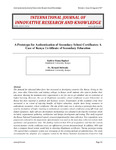A Prototype for Authentication of Secondary School Certificates: A Case of Kenya Certificate of Secondary Education

View/
Date
2017-08Author
Kaibiru, Raphael Mutua
Shibwabo, Bernard
Metadata
Show full item recordAbstract
The demand for educated labor force has increased in developing countries like Kenya. Owing to this fact, more often Universities and training colleges in Kenya enroll students who want to further their education. Meeting the minimum entry requirements is key for one to get admitted into an institution of higher learning. However, the use of illegitimate secondary school certificates to join Universities in Kenya has been reported in political and business sectors. Perpetrators of this academic crime have succeeded to an extent of enjoying benefits of higher education, despite there being measures to authenticate secondary school certificates. The aim of this study was to develop a prototype that can be used by institutions of higher learning to authenticate secondary school certificates using QR-Code and digital signatures. Agile software development methodology was adopted to develop the prototype which included; requirements gathering, architecture and design, development and testing. This study targeted the Kenya National Examination Council, research department for data collection. Ten respondents were purposively selected in this department. Questionnaire was used as the main data collection tool for both qualitative and quantitative data. The findings indicated that 87% of respondents said that the current security features on the certificates were not sufficient to prevent document fraud. In addition, 98% said that a computer based system would help in detecting illegitimate certificates. During prototype testing 78% agreed that a computer system was leveraging on the existing methods of authentication. The study recommended the adoption of a computer system by the Kenya National Examination Council to help Universities and Colleges verify and authenticate secondary school certificates before enrollment of new students.
